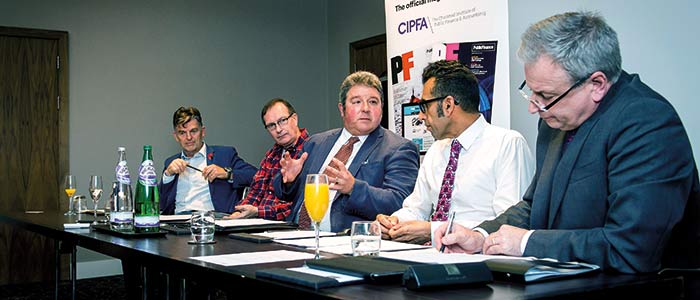
Discussions included how fiscal autonomy could support new ways of working and boost community involvement. Photo: UNP
Devolving more powers to the Scottish Parliament demands that braver decisions are made to close the gap between tax and spending in the country, a Scottish council chief executive has said.
The effects of the new powers were discussed at CIPFA Scotland’s Directors of Finance Annual Public Finance Debate in Edinburgh, on 12 November, an event sponsored by UBS Asset Management.
Addressing attendees, Dundee City Council chief executive David Martin said powers in the Scotland Bill could make a significant difference. The debate took place in the same week as legislation to pass new powers over tax and welfare to Holyrood completed its passage through the House of Commons.
“More fiscal autonomy will allow us to try some stuff that we perhaps don’t currently do but, equally, there is a significant mismatch between tax and spending,” Martin said. “I hope what will happen as a result is that politicians get braver, focus less on constitutional matters and get more innovative about finding solutions to public services and ways of doing things.”
This would require an honest discussion about “who pays for what”, as well as looking at service areas that “most people would think are broken”, said Martin, who was previously chief executive in Renfrewshire Council.
He highlighted social care and pension costs as areas for scrutiny. “Can we have an honest debate about the relative ability of our society to pay for those public services?” he asked.
Also speaking at the event, Darra Singh, who chaired the 2014 Independent Commission on Local Government Finance, which examined the funding system for English councils, agreed with Martin that the link between local taxation and services is broken.
“There should be an intimate connection between what you pay and what you receive. If you know where your money is going, you can be involved in decisions about where your tax is going – council tax in particular – to fund particular services, which can lead to greater community involvement and empowerment.”
However, revenues and services need to be connected better, he acknowledged. “The issue is how we spend money. About 50% of local government budgets in Scotland are spent on education and on social care. There is a challenge for us all about how you get connectivity going, but I think the principle is that community empowerment will be helped by greater fiscal devolution,” he said.
Dr Drew Walker, director of public health at NHS Tayside, argued there is a need for a change in how public bodies work to ensure that opportunities in the Scotland Bill and other legislation are not missed.
He highlighted the Scottish Government’s Community Empowerment Act, intended to boost local involvement in health, police and local government, which would require services such as the NHS “letting go” if it is to be successful.
“But the culture of the NHS is about command and control and they’re having real difficulty breaking out of that mindset,” Walker added.
He raised the prospect of merging local government and the NHS as one way to tackle “structural constraints”.
“The classic example is this ridiculous separation between the NHS and local authorities. I have always believed that the NHS should be part of local authorities and should be politically controlled locally, with the exception of a small amount of the NHS which is about national services which are probably best funded centrally.
“I think if the NHS came under the political control of local authorities and then was further devolved down to control through the communities, there would be fantastic opportunities for innovation.” Work around health and social care integration has created structures that could be used for this purpose if there is the “political courage” to do so, he added.
Douglas Robertson, professor of sociology, social policy and criminology at the University of Stirling, told the event that greater local responsibility for services would need to be matched by funding.
“It’s a difficult one because [the Scottish government is] handing down powers, but is there capacity to pick that up in terms of finance, or are you dumping services you can’t fund?” he asked. “That to me is a worry.”
A new approach to risk around greater community involvement in public services is needed for success, Singh added. “That does mean accepting that there will be some failures – we have to just be open about that.”
In a vote held after the debate, council finance chiefs welcomed the opportunities presented by fiscal devolution to Scotland. Senior figures overwhelmingly agreed that “the opportunities offered by fiscal responsibility for Scotland outweigh the risks” by 26 votes to four.
Speaking to Public Finance after the vote, Laura Friel, executive director of finance and corporate support at North Ayrshire Council and chair of CIPFA Scotland’s local authority directors of finance section, said the vote demonstrated optimism about the opportunities for devolution and fiscal responsibility for Scotland.
However, she stressed that, to strengthen local democracy and local accountability, fiscal control needs to be devolved to local authorities as part of community empowerment efforts.
“In terms of making decisions in the right place, community empowerment is the right thing, but there is a balance in terms of how to retain control of the finances but how you empower communities to help shape their future,” she said.
“If we really want to strengthen local democracy and local accountability, more funds need to be raised locally and the most significant element of that is non-domestic rates.
“We need to think that through quite carefully, because clearly there’s levels of protection at the moment in terms of the pool and how the pool works, so everyone needs to think about how we get there and over what time period.”











